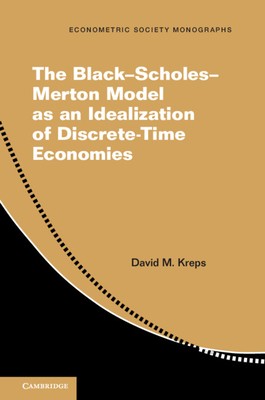
- We will send in 10–14 business days.
- Author: David M Kreps
- Publisher: Cambridge University Press
- ISBN-10: 1108486363
- ISBN-13: 9781108486361
- Format: 15.9 x 23.5 x 1.4 cm, hardcover
- Language: English
- SAVE -10% with code: EXTRA
The Black-Scholes-Merton Model as an Idealization of Discrete-Time Economies (e-book) (used book) | bookbook.eu
Reviews
Description
This book examines whether continuous-time models in frictionless financial economies can be well approximated by discrete-time models. It specifically looks to answer the question: in what sense and to what extent does the famous Black-Scholes-Merton (BSM) continuous-time model of financial markets idealize more realistic discrete-time models of those markets? While it is well known that the BSM model is an idealization of discrete-time economies where the stock price process is driven by a binomial random walk, it is less known that the BSM model idealizes discrete-time economies whose stock price process is driven by more general random walks. Starting with the basic foundations of discrete-time and continuous-time models, David M. Kreps takes the reader through to this important insight with the goal of lowering the entry barrier for many mainstream financial economists, thus bringing less-technical readers to a better understanding of the connections between BSM and nearby discrete-economies.
EXTRA 10 % discount with code: EXTRA
The promotion ends in 13d.20:01:27
The discount code is valid when purchasing from 10 €. Discounts do not stack.
- Author: David M Kreps
- Publisher: Cambridge University Press
- ISBN-10: 1108486363
- ISBN-13: 9781108486361
- Format: 15.9 x 23.5 x 1.4 cm, hardcover
- Language: English English
This book examines whether continuous-time models in frictionless financial economies can be well approximated by discrete-time models. It specifically looks to answer the question: in what sense and to what extent does the famous Black-Scholes-Merton (BSM) continuous-time model of financial markets idealize more realistic discrete-time models of those markets? While it is well known that the BSM model is an idealization of discrete-time economies where the stock price process is driven by a binomial random walk, it is less known that the BSM model idealizes discrete-time economies whose stock price process is driven by more general random walks. Starting with the basic foundations of discrete-time and continuous-time models, David M. Kreps takes the reader through to this important insight with the goal of lowering the entry barrier for many mainstream financial economists, thus bringing less-technical readers to a better understanding of the connections between BSM and nearby discrete-economies.


Reviews